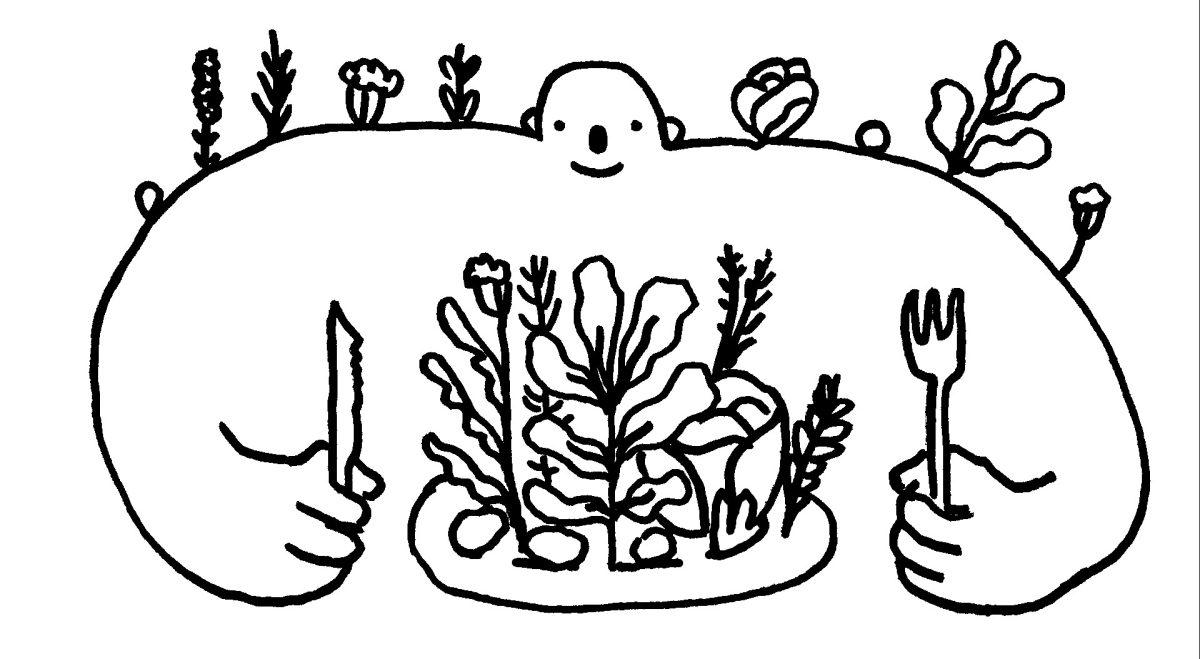These days, many Oles are trying to reduce their meat consumption, whether for environmentalism, personal health or animal welfare causes. This year I’ve been trying to be more cognizant of the meat I eat, taking the very small step of eating vegetarian a few days a week and not eating meat more than once a day.
In my own mild attempt to be a more conscious eater, I noticed changes made since last semester have greatly reduced choices in Stav hall for students avoiding meat, a group who already faced a much narrower range of options in their diet — it seems that amid necessary covid restrictions and potential budgetary restrictions, the needs of vegetarians and meat-conscious students were the first to be forgotten.
For a broader perspective, I spoke with a few students about their own experience navigating Stav’s limited options for vegetarians or vegans on campus. Colin Lang ’21 and Lily Braafladt ’22, both vegetarians, shared concerns about the disappearance of the black bean burger from the grill line as a consistent high protein offering and a satisfying addition to a meal.
The tortilla station’s disappearance also means the loss of consistent bean offerings – Braafladt noted that rice and beans were a go-to alongside the black bean burger, and the simultaneous loss of both options makes vegetarians dependent on the cafeteria’s tofu for protein-dense additions to meals.
Alternatives in general are less plentiful in this year’s cafeteria. The tortilla line’s disappearance and grill’s lack of a consistent vegetarian main means two meal options are gone, leaving many students to choose between the bowls line’s vegetarian option and whatever may be in the grain line. Lang noted the disappearance of a vegetarian soup – while one of two soups used to be consistently meat-free while the other may or may not have contained meat, Stav now only serves one soup each meal, and it usually contains meat.
Even salad offerings have gone carnivorous, now frequently containing heavy additions of bacon or salami to pre-prepared salads. Furthermore, the President of the St. Olaf Vegan and Vegetarian club Grace Pugh ’21, a vegan herself, noted that the disappearance of the panini press and general paring down of ingredient availability has also limited the ability of students with dietary restrictions to prepare caf creations.
The widespread elimination of non-meat options greatly narrows students’ ability to eat a balanced, nutritious vegetarian diet.
Still, Stav is not all doom and gloom even for those with diets more restrictive than simple vegetarianism. Pugh emphasized that St. Olaf’s options were generous compared to the University of Nebraska, where she had previously studied, and while options are limited, Oles can certainly still find a healthy, balanced diet in the cafeteria while eating vegan or vegetarian. “It’s still very doable,” she said, noting that some disadvantageous changes are likely temporary necessities for the sake of limiting COVID-19 exposure in the cafeteria.
Lang noted that the addition of a vegetarian sausage has been much appreciated, and the occasional introduction of lab-grown plant-based meat is a welcome innovation. “It’s a trade-off,” he summed up, with some plant-based offerings being particularly good but vegetarian offerings more broadly declining in consistency and variety.
If you’re debating whether or not to restrict meat within your own diet, St. Olaf still offers a supportive environment to experiment. In fact, a growing body of outspoken meat-conscious eaters will be essential to promoting meaningful change in Stav.
So far this semester student requests have failed to persuade the cafeteria to make the home line vegetarian, even on rare occassions. In part the lack of changes represents Bon Appetit’s subscription to a traditional American culinary philosophy, placing meat at the center of the meal, with starches and vegetables only adjacent to the main course. But the stalwart meat-based menu also shows the limits of individual requests for accommodations.
Our best shot at real change is by organizing through student groups like Vegan and Vegetarian club for collective advocacy, making it clear that a tasty plant-based diet is not just the preference of a few individuals but a broad desire among students that the school could better serve.
St. Olaf’s Vegan and Vegetarian club meets every other Wednesday from 7:30-8:30pm online.
John Emmons ’23 is from
Seattle, WA.
His major is undelcared.



